
Michael David Watt is an American bassist, vocalist and songwriter. He co-founded and played bass guitar for the rock bands Minutemen (1980–1985), Dos (1985–present), and Firehose (1986–1994). He began a solo career with the 1995 album Ball-Hog or Tugboat? and has since released three additional solo albums, most recently in 2010 with Hyphenated-man. He is also the frontman for the supergroup Big Walnuts Yonder (2008–present), a member of the art rock group Banyan (1997–present) and is involved with several other musical projects. From 2003 until 2013, he was the bass guitarist for The Stooges.
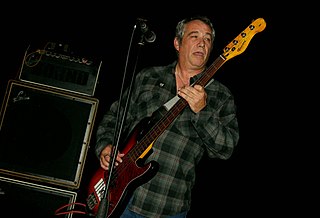
Firehose was an American alternative rock band consisting of Mike Watt, Ed Crawford, and George Hurley (drums). They were initially active from 1986 to 1994, and briefly reunited in 2012.

Dennes Dale Boon, also known as D. Boon, was an American musician, best known as the guitarist, singer and songwriter of the punk rock trio Minutemen.

George Hurley is a drummer noted for his work with Minutemen and fIREHOSE.
The Black Gang was a rock music trio formed in 1997 by American musician Mike Watt to record and tour behind his second solo album, Contemplating The Engine Room. Of all of the "project" Watt has formed since the disbanding of Firehose in 1994, The Black Gang has gone through the most permutations of any of Watt's backing groups.
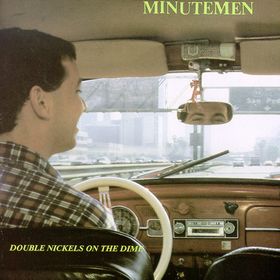
Double Nickels on the Dime is the third album by American punk trio Minutemen, released on the SST Records in July 1984. A double album containing 45 songs, Double Nickels on the Dime combines elements of punk rock, funk, country, spoken word and jazz, and references a variety of themes, from the Vietnam War and racism in America, to working-class experience and linguistics.

D. Boon and Friends is a compilation album of home recordings featuring American musician D Boon, of the band Minutemen. The album is the inaugural release of the Hermosa Beach, California-based label Box-O-Plenty Records, started by Boon's one-time roommate Richard Derrick. Most of the tracks are living-room jam sessions done by Boon, Derrick, and Crane, who had previously contributed backing vocals and trumpet parts to Minutemen's Buzz or Howl Under the Influence of Heat and Project: Mersh EP's.

Paranoid Time is the debut EP by American hardcore punk band Minutemen. It is also the second ever release by the SST record label, founded by Black Flag's Greg Ginn and Chuck Dukowski. The album cover is a drawing by the American artist Raymond Pettibon.
The Reactionaries were an American punk rock band formed in San Pedro, Los Angeles, California, in 1978. The band's continual members were lead vocalist Martin Tamburovich, guitarist D. Boon, bassist Mike Watt, and drummer George Hurley. The Reactionaries existed for most of 1978 and 1979, practicing regularly but rarely if ever performing live. After their breakup in late 1979, Watt and Boon formed Minutemen with drummer Frank Tonche and Hurley joined Hey Taxi!; Hurley joined Minutemen soon afterwards, replacing Tonche.
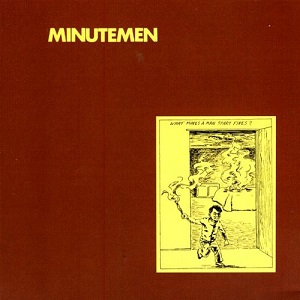
What Makes a Man Start Fires? is the second studio album by American punk rock band Minutemen, released in January 1983 by SST.

Buzz or Howl Under the Influence of Heat is the fourth EP by American hardcore punk band Minutemen, released by SST Records in November 1983.

The Politics of Time is the first compilation album by American hardcore punk band Minutemen, released in 1984 through New Alliance Records.

"Ballot Result" is a posthumous live album by Minutemen, released in 1987 by SST Records.
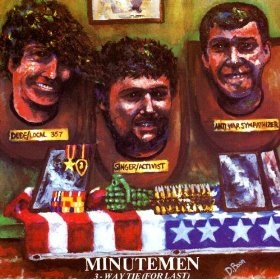
3-Way Tie is the fourth and final full-length album by American punk band Minutemen, released in 1985 by SST Records. It features covers of songs by the Urinals, Meat Puppets, Blue Öyster Cult, Creedence Clearwater Revival, and Roky Erickson. The last song, a cover of Erickson's "Bermuda", was sung over the phone by Mike Watt.

Project: Mersh is the final extended play by American punk rock trio Minutemen, released on April 8, 1985 through SST Records. It is the band's penultimate release before the death of frontman and composer D. Boon later that year due to injuries sustained in an auto accident.

Ragin', Full-On is the first album by American alternative rock band fIREHOSE. It was released after the breakup of the influential punk rock band Minutemen due to the death of the guitarist D. Boon. Like all fIREHOSE albums, Ragin', Full-On is dedicated to Boon.
Joe Baiza is an American guitarist, vocalist and songwriter. Most of Baiza's music touches on a fusion of punk rock and jazz. Eugene Chadbourne cites Baiza as one of the most noteworthy guitarists to emerge from the Southern California punk rock milieu.

Minutemen were an American punk rock band formed in San Pedro, California, in 1980. Composed of guitarist/vocalist D. Boon, bassist/vocalist Mike Watt, and drummer George Hurley, Minutemen recorded four albums and eight EPs before Boon's death in an automobile accident in 1985; the band broke up shortly thereafter. They were noted in the California punk community for a philosophy of "jamming econo"—a sense of thriftiness reflected in their touring and short, tight songs, and for their eclectic style, drawing on hardcore punk, funk, jazz, and other sources.

Funland is the third album by American improvisational band Unknown Instructors, featuring Mike Watt, George Hurley, Joe Baiza, poet/saxophonist Dan McGuire. The album features guest vocals by David Thomas and artist Raymond Pettibon.
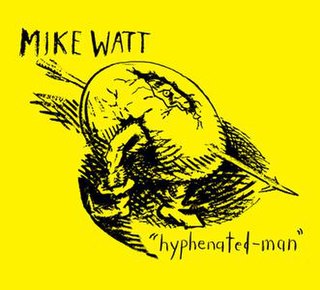
Hyphenated-man is the fourth solo album by Mike Watt, and the first full-length recording he made under his own name since parting with Columbia Records in 2005. Initially released in Japan by Parabolica Records in October 2010, the album was released in the rest of the world on clenchedwrench, an independent record label newly founded by Watt. He is accompanied on the album by his Mike Watt + The Missingmen bandmates, guitarist Tom Watson and drummer Raul Morales.

















